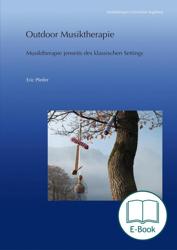This book offers an overview presenting and discussing the potentials, capabilities and settings of Outdoor Music Therapy in a theoretical and practical manner and comparing them to relevant music therapeutic developments (such as Community Music Therapy). Furthermore the results and knowledge gained through a survey concerning the characteristics of Outdoor Music Therapy, in which internationally renowned music therapists participated, are debated. The adventurous, belletristic style of writing invites a wide readership to “plunge” into the careful, healthy world of Outdoor Music Therapy.
An innovative idea, a refreshing and contemporary concept within music therapy is to be presented within this piece of work – “Outdoor Music Therapy”. This concept uses and establishes most diverse, natural and meaningful possibilities concerning the setting in which curative and preventive therapeutic treatment/activity is happening. The concept itself is based on the author’s own vast experience and knowledge in this field.
What is more, comparisons and distinctions between Outdoor Music Therapy and other relevant existing, maybe even close music therapeutic approaches are created, discussed and the resulting findings to be looked upon critically.
Additionally, the book offers insights into the outcomes gained through a survey, which handled the question if recordings, created in the versatile setting of Outdoor Music Therapy, can be distinguished from recordings produced in a more traditional, classical music therapeutic surrounding. The participants in the survey were all together well-known, experienced music therapists from all over the world (from USA via Norway and Austria to Australia). The results are suprising and allow a careful, summarizing formulation of knowledge, conceding Outdoor Music Therapy mindful, particularizing qualities. Subsequently the interviewees were asked to mention associations, to justify their decisions and to tell about possible personal experience with Outdoor Music Therapy of their own - these aspects are also included in the book.
The concept of Outdoor Music Therapy may seek its scientific usefulness in a way that it could be called modern, especially in Central Europe. Novel, ecological (possibly even economical) capabilities, space and surroundings of music therapeutic treatment are developed and opened up. In present days of creating and spreading pathological disturbance patterns and terms of illnesses such as “Nature Deficit Disorder” or “Nature Deficiency Symptome” over our society, maybe music therapy too has to be open-minded about necessary developments, regarding a sensitive treatment taking place where the patient, client is situated, in his/her natural environment - keeping in mind, that this environment can be quite different to the classical setting.
As a matter of fact the author approaches the topic consciously using an easily legible, belletristic style and language, perfectly suiting the adventurous, vivid characteristics of the therapeutic sessions forming the foundation of his implementations. Aiming a professional, theoretical profound manner in order to report about concepts and attempts, there is also an intention to offer readers with various backgrounds a fair opportunity to easily get into the subject matter. The book itself addresses a wide readership: (music) therapists, (music, adventure, social, preschool) pedagogues/educationalists, teachers, educators, parents, social workers, musicians, young and old adventurers and nature lovers and many, many more.
„Outdoor Musiktherapie“ verspricht eine neuartige und vor allem in Mitteleuropa bisher selten angewandte Form der Musiktherapie, die durch ihre Ganzheitlichkeit, Natürlicheit und Vielfältigkeit beeindruckt. Der Autor Eric Pfeifer verfasste dieses Buch aufgrund praktischer Durchführungen und liefert damit der Reihe „Musiktherapie Universität Augsburg“ einen Beitrag, der ein Beispiel für die innovativen musiktherapeutischen Formen und Methoden dieser Zeit ist. (...) Die abgebildeten Fotografien und Fallvignetten stellend das Projekt äußerst lebendig und unterhaltsam dar, durch die gründliche Recherche bleibt der Beitrag aber auf wissenschaftlichem Niveau. (...) Das Buch besticht durch den belletristischen und somit leicht verständlich aber gleichsam wissenschaftlich fundierten Stil. Man wird von Pfeifer ausführlich in die Thematik eingeführt, bekommt wissenschaftliche Hintergründe geliefert und gewinnt durch praxisnahe Beispiele und die genaue Darstellung eines Projektes einen Einblick in Methoden und Vorgehensweisen sowie in (persönliche) Ergebnisse. So profitiert man in ganz besonderem Maße von Pfeifers großem Erfahrungsschatz und seinen praktischen Tätigkeiten.
Nina Voit
In: Musik-,Tanz-, und Kunstherapie, (2012) Heft 23 (1) S. 48-51.
-------------------------------
„Nützlich ist die Arbeit in erster Linie für Musiktherapeuten, die ihre Arbeitsmethoden auf den „Outdoorbereich“ ausdehnen möchten und nach Anregungen für ihr methodisches Vorgehen suchen. (...)
Die Arbeit soll als ein „Türaufstoßer“ fungieren, wie der Autor selber sagt; d.h., sie soll den LeserInnen Denkanstösse bieten für einen Zugang zum musiktherapeutischen Arbeiten draußen, sei es in der freien Natur oder zumindest außerhalb der gewohnten Therapieräume – mehr nicht. Vom Trommeln in der Schwitzhütte über den Bau von Schwirrhölzern zur Durchführung von Lauschwanderungen gibt es zahlreiche Szenebeschreibungen, die die LeserInnen zu eigenen Versuchen motivieren könnten.“
Wolfgang Krieger
In: socialnet.de
http://www.socialnet.de/rezensionen/13122.php (21. November 2012)
Eric Pfeifer
is pedagogue and teacher. Studies and final degrees in musical education and English, master’s degree (Master of Arts) in music therapy (university of Augsburg); awarded composer; occupation as a teacher, social education worker, musician, scientific/academic research fellow and lecturer at the Leopold Mozart Centre (University of Augsurg); music therapeutic work in fields of neurological rehabilitation, children and youth, psychiatry, cardiology, schools, prevention, migration; doctoral candidate at the university of Augsburg (“Music Therapy as a Promotional Measure for Integration of Children with Migratory Backgrounds. A study of First Graders in Austria.”)


 Sample
Sample